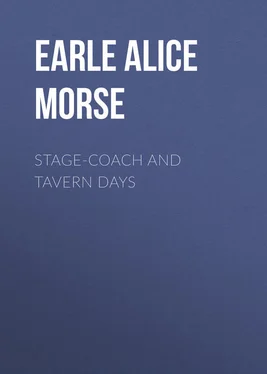Alice Earle - Stage-coach and Tavern Days
Здесь есть возможность читать онлайн «Alice Earle - Stage-coach and Tavern Days» — ознакомительный отрывок электронной книги совершенно бесплатно, а после прочтения отрывка купить полную версию. В некоторых случаях можно слушать аудио, скачать через торрент в формате fb2 и присутствует краткое содержание. Жанр: foreign_antique, foreign_prose, на английском языке. Описание произведения, (предисловие) а так же отзывы посетителей доступны на портале библиотеки ЛибКат.
- Название:Stage-coach and Tavern Days
- Автор:
- Жанр:
- Год:неизвестен
- ISBN:нет данных
- Рейтинг книги:4 / 5. Голосов: 1
-
Избранное:Добавить в избранное
- Отзывы:
-
Ваша оценка:
- 80
- 1
- 2
- 3
- 4
- 5
Stage-coach and Tavern Days: краткое содержание, описание и аннотация
Предлагаем к чтению аннотацию, описание, краткое содержание или предисловие (зависит от того, что написал сам автор книги «Stage-coach and Tavern Days»). Если вы не нашли необходимую информацию о книге — напишите в комментариях, мы постараемся отыскать её.
Stage-coach and Tavern Days — читать онлайн ознакомительный отрывок
Ниже представлен текст книги, разбитый по страницам. Система сохранения места последней прочитанной страницы, позволяет с удобством читать онлайн бесплатно книгу «Stage-coach and Tavern Days», без необходимости каждый раз заново искать на чём Вы остановились. Поставьте закладку, и сможете в любой момент перейти на страницу, на которой закончили чтение.
Интервал:
Закладка:
A picturesque and grotesque element of tavern life was found in those last leaves on the tree, the few of Indian blood who lingered after the tribes were scattered and nearly all were dead. These tawnies could not be made as useful in the tavern yard as the shiftless and shifting negro element that also drifted to the tavern, for the Eastern Indian never loved a horse as did the negro, and seldom became handy in the care of horses. These waifs of either race, and half-breeds of both races, circled around the tavern chiefly because a few stray pennies might be earned there, and also because within the tavern were plentiful supplies of cider and rum.
Almost every community had two or three of these semi-civilized Indian residents, who performed some duties sometimes, but who often in the summer, seized with the spirit of their fathers or the influence of their early lives, wandered off for weeks and months, sometimes selling brooms and baskets, sometimes reseating chairs, oftener working not, simply tramping trustfully, sure of food whenever they asked for it. It is curious to note how industrious, orderly Quaker and Puritan housewives tolerated the laziness, offensiveness, and excesses of these half-barbarians. Their uncouthness was endured when they were in health, and when they fell sick they were cared for with somewhat the same charity and forbearance that would be shown a naughty, unruly child.
Often the landlady of the tavern or the mistress of the farm-house, bustling into her kitchen in the gray dawn, would find a sodden Indian sleeping on the floor by the fireplace, sometimes a squaw and pappoose by his side. If the kitchen door had no latch-string out, the Indian would crawl into the hay in the barn; but wherever he slept, he always found his way to the kitchen in good time for an ample breakfast.
Indian women often proved better helpers than the men. One Deb Browner lived a severely respectable life all winter, ever ready to help in the kitchen of the tavern if teamsters demanded meals; always on hand to help dip candles in early winter, and make soap in early spring; and her strong arms never tired. But when early autumn tinted the trees, and on came the hunting season, she tore off her respectable calico gown and apron, kicked off her shoes and stockings, and with black hair hanging wild, donned moccasins and blanket, and literally fled to the woods for a breath of life, for freedom. She took her flitting unseen in the night, but twice was she noted many miles away by folk who knew her, tramping steadily northward, bearing by a metomp of bark around her forehead a heavy burden in a blanket.
One Sabbath morning in May a travelling teamster saw her in her ultra-civilized state on her way home from meeting, crowned, not only with a discreet bonnet, but with a long green veil hanging down her back. She was entering the tavern door to know whether they wished her to attack the big spring washing and bleaching the following day. “Hello, Teppamoy!” he said, staring at her, “how came you here and in them clothes?” Scowling fiercely, she walked on in haughty silence, while the baffled teamster told a group of tavern loafers that he had been a lumberman, and some years there came to the camp in Maine a wild old squaw named Teppamoy who raised the devil generally, but the constable had never caught her, and that she “looked enough like that Mis’ Browner to be her sister.”
Another half-breed Indian, old Tuggie Bannocks, lived in old Narragansett. She was as much negro as Indian and was reputed to be a witch; she certainly had some unusual peculiarities, the most marked being a full set of double teeth all the way round, and an absolute refusal ever to sit on a chair, sofa, stool, or anything that was intended to be sat upon. She would sit on a table, or a churn, or a cradle-head, or squat on the floor; or she would pull a drawer out of a high chest and recline on the edge of that. It was firmly believed that in her own home she hung by her heels on the oaken chair rail which ran around the room. She lived in the only roofed portion of an old tumble-down house that had been at one time a tavern, and she bragged that she could “raise” every one who had ever stopped at that house as a guest, and often did so for company. Oh! what a throng of shadows, some fair of face, some dark of life, would have filled the dingy tavern at her command! I have told some incidents of her life in my Old Narragansett , so will no longer keep her dusky presence here.
Other Indian “walk-abouts,” as tramps were called, lived in the vicinity of Malden, Massachusetts; old “Moll Grush,” who fiercely resented her nickname; Deb Saco the fortune-teller, whose “counterfeit presentment” can be seen in the East Indian Museum at Salem; Squaw Shiner, who died from being blown off a bridge in a gale, and who was said to be “a faithful friend, a sharp enemy, a judge of herbs, a weaver of baskets, and a lover of rum.”
Another familiar and marked character was Sarah Boston. I have taken the incidents of her life from The Hundredth Town , where it is told so graphically. She lived on Keith Hill in Grafton, Massachusetts, an early “praying town” of the Indians. A worn hearthstone and doorstone, surrounded now by green grass and shadowed by dying lilacs, still show the exact spot where once stood her humble walls, where once “her garden smiled.
The last of the Hassanamiscoes (a noble tribe of the Nipmuck race, first led to Christ in 1654 by that gentle man John Eliot, the Apostle to the Indians), she showed in her giant stature, her powerful frame, her vast muscular power, no evidence of a debilitated race or of enfeebled vitality. It is said she weighed over three hundred pounds. Her father was Boston Phillips, also told of in story and tradition for his curious ways and doings. Sarah dressed in short skirts, a man’s boots and hat, a heavy spencer (which was a man’s wear in those days); and, like a true Indian, always wore a blanket over her shoulders in winter. She was mahogany-red of color, with coarse black hair, high cheek-bones, and all the characteristic features of her race. Her great strength and endurance made her the most desired farm-hand in the township to be employed in haying time, in wall-building, or in any heavy farm work. Her fill of cider was often her only pay for some powerful feat of strength, such as stone-lifting or stump-pulling. At her leisure times in winter she made and peddled baskets in true Indian fashion, and told improbable and baseless fortunes, and she begged cider at the tavern, and drank cider everywhere. “The more I drink the drier I am,” was a favorite expression of hers. Her insolence and power of abuse made her dreaded for domestic service, though she freely entered every home, and sat smoking and glowering for hours in the chimney corner of the tavern; but in those days of few house-servants and scant “help,” she often had to be endured that she might assist the tired farm wife or landlady.
A touch of grim humor is found in this tale of her – the more humorous because, in spite of Apostle Eliot and her Christian forbears, she was really a most godless old heathen. She tended with care her little garden, whose chief ornament was a fine cherry tree bearing luscious blackhearts, while her fellow-townsmen had only sour Morellos growing in their yards. Each year the sons of her white neighbors, unrestrained by her threats and entreaties, stripped her tree of its toothsome and beautiful crop before Sarah Boston could gather it. One year the tree hung heavy with a specially full crop; the boys watched eagerly and expectantly the glow deepening on each branch, through tinted red to dark wine color, when one morning the sound of a resounding axe was heard in Sarah’s garden, and a passer-by found her with powerful blows cutting down the heavily laden tree. “Why, Sarah,” he asked in surprise, “why are you cutting down your splendid great cherry tree?” – “It shades the house,” she growled; “I can’t see to read my Bible.”
Читать дальшеИнтервал:
Закладка:
Похожие книги на «Stage-coach and Tavern Days»
Представляем Вашему вниманию похожие книги на «Stage-coach and Tavern Days» списком для выбора. Мы отобрали схожую по названию и смыслу литературу в надежде предоставить читателям больше вариантов отыскать новые, интересные, ещё непрочитанные произведения.
Обсуждение, отзывы о книге «Stage-coach and Tavern Days» и просто собственные мнения читателей. Оставьте ваши комментарии, напишите, что Вы думаете о произведении, его смысле или главных героях. Укажите что конкретно понравилось, а что нет, и почему Вы так считаете.












